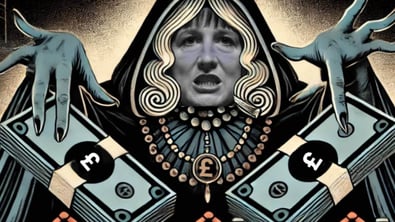Britain’s housing market was rocked in September by the government’s mini budget.
Mortgage rates were pulled by retail banks in anticipation of more costly products.
What was the outcome and will this week’s u-turn return the market to normality? This blog post investigates.
What was the mini budget?
The mini budget which was unveiled by the UK Chancellor of the Exchequer Kwasi Kwarteng included cutting or a halting of planned increases to tax rates for businesses and individuals.
The announcement followed Thursday’s statement that the National Insurance increase will be reversed from 6 November as part of the government’s “pro-growth agenda”.
The government statement said that 920,000 businesses would save almost £10,000 on average next year and 20,000 businesses are taken out of paying National Insurance. Corporation tax – which was planned to increase to 25% in April – would be frozen at 19%.
The Growth Plan 2022 “makes growth the government’s central economic mission, setting a 2.5% trend in gross domestic product (GDP), by launching supply-side reforms and cutting taxes for businesses”.
What happened to the property market in September?
However, the markets did not react well to the mini budget.
One headline declared:
“Homebuyers are gripped by panic after the Bank of England said it would not hesitate to lift its main interest rate in response to the government’s splurge that many see as further fuelling sky-high inflation.”
Home-loan providers, which offer mortgages based on the central bank’s rate, scraped about 40% of available products in the immediate aftermath of the budget on 23 September.
This equated to more than 1,600 mortgage rates offered for a fixed period.
The Bank of England has in less than a year hiked its interest rate to 2.25% from a record-low of 0.1% in a bid to cool decades-high inflation.
Experts are predicting the Bank of England’s rate will peak at close to 6% in the first half of next year.
The mini budget had far-reaching consequences, the value of pound sterling crashing, pension funds and insurance giants rushing to sell bonds.
The Bank of England launched a temporary bond-buying programme which, according to ftadviser, “is trying to bail out a government plan five days after it was introduced.”
Did the markets recover?
He adds that most borrowers since the financial crisis will have been stress tested at about 7% so in theory should be able to afford current higher rates, but that stress testing did not factor in the huge increase in the cost of another item of essential expenditure – energy costs.
Raymond said, “Because of the large increase in property prices most people, even those who borrowed 95%, will have equity in their property and as most people are on a fixed rate they will have time to think about whether they can afford the new higher rates when their current deal ends and if not take action before the risk of default, but inevitably some will leave it too late.”
The property market is still performing well, despite the changes, according to Zoopla’s September House Price Index.
The current UK house price growth stands at 8.2%.
The report states: “New sales are holding up with no sudden drop in demand in recent weeks.”
The housing market is transitioning to a buyers’ market as higher mortgage rates could cut buying power by 28%.
The report has found:
“The macro backdrop for the housing market has evolved rapidly over the summer. Central banks have increased interest rates to bring down inflation. Rising energy prices are adding to the cost-of- living squeeze. UK consumer confidence has hit an all-time low. Despite this challenging backdrop, these factors have not yet had a material impact on leading indicators of sales market activity.
“The strong start to the year has carried the momentum into the summer. As we enter the autumn selling season, demand for housing continues to soften and is much lower than this time last year. UK- wide demand remains 8% above the 5-year average, supported by strong buyer interest in affordable markets, such as Scotland . All other regions have demand in line with the 5-year average.
“The UK government has responded with tax cuts and an energy price cap to support housing demand. Changes to stamp duty will boost some segments but the recent spike in borrowing costs are set to push mortgage rates higher.
This momentum in price rises has supported measures of market activity in H1 2022. There are no immediate signs of a major slowdown in price inflation. The average UK house price has increased by 8.2% or £19,650 in the past 12 months, although the quarterly growth rate is slowing. Looking ahead, higher mortgage rates will have the greatest impact on activity in higher value markets and areas which have registered the greatest surge in prices over the pandemic.”
Zoopla’s report shows the “early signs of price sensitivity from the scale of reductions in asking prices of homes for sale. Sellers want to maximise the value of their homes and when house prices are rising quickly, agents need to anticipate the strength of demand and price ahead of the market as needed. However, when demand starts to shift, agents and owners need to adjust as well.”
Due to the conditions “there has been a clear upward trend in the proportion of listing which have had asking prices reduced by 5% or more over the spring and summer. The latest data shows that 6% of homes listed for sale have seen the asking price adjusted downwards.
“This is the highest level since before the pandemic, although re-pricing is a common seasonal trend as we enter the autumn market. Given the economic backdrop, we see this as a move to more of a buyer’s market after two years of a red hot sellers market.”
What does the 2022 market mean for property investors?
The impact of the exchange rate means that the price of houses in the UK are cheaper for international property investors. The UK property market is a “safe haven” for investors who want year-on-year, consistent property growth.
Property is still safest asset class in the UK, as saving rates have barely risen and money in savings accounts is therefore struggling compared to the rate of inflation.
The property market has never crashed, unlike stock markets. Investing in crypto is dangerous as 70% falls in value are not uncommon.
A survey from Nationwide has found that property prices have increased by 11.4% in the last 12 months. New homes have increased by 14.5%.
Property prices have increased steadily since records began and any decrease in property prices, in relative terms, will only take property prices back to around 18 months ago and does not take into account the inflation trend.
Research by Shelter and KPMG has predicted that property prices will quadruple in a generation. By 2034 the average house price is estimated to be £902,763 (this is trebling of value compared to the present day).
The main reason for this is population growth. The UK population has risen by around 20 million in the past 50 years, and housing supply has not kept up with demand.
To watch Paul’s latest video ‘Property market crash in the UK in 2022’ click here.
For more information call us on 01302 897131 or email office@touchstoneeducation.co.uk.











